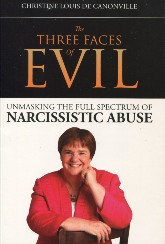Do you understand the phenomenon of Narcissistic Supply?
Understanding the phenomenon of Narcissistic Supply is critical to understanding the narcissistic personality disorder and the narcissist’s behavior. Narcissists are addicted to “attention”, and they get their fix through their narcissistic supply.
Basically, there are two categories of narcissistic supply, Primary Narcissistic Supply and. Secondary Narcissistic Supply:-
Primary Narcissistic Supply provides all of the attention that the narcissist addict craves. The nature of the attention can be experienced in either a public form (such as fame, celebrity, notoriety, or infamy etc.), or in a private form (such as admiration, flattery, acclaim, fear, repulsion etc.). As you can see, it does not matter whether the attention is positive or negative, as long as the narcissist is centre stage; one is as powerful as the other to him.
Secondary Narcissistic Supply alludes to those people or things that provide supply on a regular basis (such as a spouse, children, friends, colleagues, partners, students, etc.). This particular form of supply allows the narcissist to lead a more normal existence, it provides him with pride, financial safety, social distinction and the alliance that he needs.
However, narcissistic supply is not confined to people only, it can be applied to any inanimate object that has the ability to attract attention and admiration to the narcissist, (for example, a flash car, property, clothes, being a member of a church, cult, club, or a business). In short, anything that acts as status symbols for the narcissist is narcissistic supply.
When deprived of Narcissistic Supply (primary or secondary) the narcissist experiences symptoms similar to the withdrawal symptoms of a drug addict: he becomes delusional, agitation, helpless and emotionally unhinged, he disintegrates and crumbles, and may even experience a psychotic episode. He engages in “magical thinking” because he believes that he is authoritative, omniscient, omnipotent, therefore he will always win. This makes him fearless and relentless in pursuit of his revenge, a revenge that, in his head, will be triumphant (The God Complex). All these aspects together make him highly dangerous when his source of supply is threatened.






Brian, I have to disagree. Narcissists/Sociopaths/Psychopaths all have primary and secondary sources of supply. Primary supply sources are plentiful, come and go, disguarded…reeled back in for a second round whether it be short term or long term. It becomes a game of sorts to the Cluster B disordered individual.
The secondary supply source generally stands alone, are sought out for very specific reasons , none of which have to do with love. While looking for weaknesses in primary sources they are looking for strengths in selecting a secondary source. Strong, independent, good job, home, children, social..etc. secondary supply sources are capable of handling all without any help from the Narissistic Sociopath. Why? Well, it’s simple. They free up quite a bit of time for “other interests.” Two entirely different mindsets. They seek primary sources and prey on their weaknesses and seek secondary sources on their strengths. Neither includes love but they will fight to the end to hang on to that secondary source who everyone knows and likes and made them look normal.
Does it matter? I think it does matter in recovery to know what role you played…but, no one will need to tell you. Once a victim starts educating herself she/he will quickly know whether they were a primary or secondary source .
I will add that if you’re the secondary source and you disguard them…you’ve now placed yourself in an unsafe situation. That does not occur with primary sources.
The fact that you are asking, means you have insight and self-awareness enough to likely NOT have the disorder.
Wanting attention, admiration, success, achievement…or any outwardly social form of recognition, does not mean someone has the disorder. While there may be people on a sliding scale of narcissistic tendencies, the disorder is abusive to others.
Narcs (can) appear to be very emotional in a positive way. But the truth is, it is not from a place of empathy for others.
It is from a place of sympathy for themselves (although they will never acknowledge or admit that).
SO, again, the fact that you are asking and concerned (in my opinion) shows that you CARE about your perception to the world. Your love language and feelings of accomplishment are simply rewarded through public recognition. If you are concerned that it is unhealthy or projects an undesirable reputation, simply being self-aware and attentive to positive self-changes is a great thing. Narcs do not feel like they are or have any self-issues!
I feel like it is damaging for people to think of themselves as narcissistic supply. I think it also gives chronic abuse victims the excuse they are looking for to stay in bad relationships because the person needs them for something. Narcissists only need people for the superficial things they can get from them. In other words, a human being is almost never the actual narcissistic supply; people are only the source of narcissistic supply. It is a subtle distinction, but an important one. The individual is only important to the narcissist for what the narcissist gets from the person. In almost all cases, they don’t need anything from any specific individual. Whoever can provide the real supply they crave will suffice. The actual human being only act as the vessel through which narcissistic supply flows. The real supply is the respect, admiration, control, etc. that they get from the person. More often than not, they will take it from the easiest source they can find. Most of the time, the person acting as the source of narcissistic supply is a lot more objectified in the relationship than they think they are.
Well, I have been reading about narcissists for a while. I agree that most people prefer (enjoy) many of the things that Narcissists need like air.
The big difference is what happens (how a person reacts) when they don’t get what they want/need/hoped for.
Normal person will be able to accept that in a decent manner. There might be a change of emotion or mildly expressed disappointment.
Narcissists go into Narcissistic Range – because they have received a Narcissistic Injury (due to thing not going their way). And that includes temper tantrums, revenges, putting others down etc.
Doesn’t everyone want these things at times? What’s the difference between wanting attention, admiration, social status, etc. in a healthy person versus a narcissistic person? How do I know if I am (or am not) a narcissist myself?
Hi Jaxx Keep an eye on my website (narcissistic behavior.net), I will post any workshops I am doing there. I have recorded 3 of my workshops, and hopefully they will be available in the Autumn (2016) for anybody who wants to know more on the subject but cannot get to Dublin. I am glad that the information on my site helped you, but actually it was your own strength: doing your own research, reflecting on what action you needed to take, and having the courage to get out of there. Not every body is able to do what you did, and then to stay firm when he presented himself on the end of your phone after a year. You really should take the credit yourself. Stay safe. Christine
I missed the Mommie darling event in Dublin , will it be repeated? It’s fantastic to understand the dynamics in my marriage to a narcissistic husband . It all makes sense now , my mother is narcissistic too.
Wow , it all seems clear now . I am a narciccistic supply , no wonder I have been living in hell . Thank god for your work , I separated from my husband after so much gas lighting I nearly had a breakdown . It’s over a year and he called me last night , if I had been my old self I would have fallen for his sweet talk . Thank you Christine I believe reading your work truly saved my life. That was when I left him over a year ago . Be warned though if you are a supply like me , when they are bored they will do there best to mess your mind up again . I am still healing . Thanks to you though or I may not have been here to tell the story . My husband has very violent rages .
I think this is among the most vital info for me. And i am glad reading
your article. But wanna remark on some general things, The site style is ideal, the articles
is really excellent : D. Good job, cheers